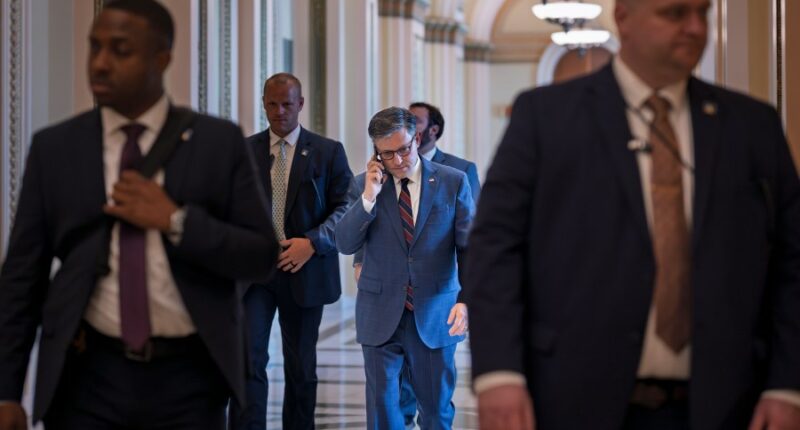Share this @internewscast.com

WASHINGTON (AP) The Republican-led Congress has passed President Donald Trump’s request to claw back about $9 billion in public broadcasting and foreign aid spending.
Trump’s Republican administration is employing a rarely used tool that allows the president to transmit a request to cancel previously approved funding authority. Democrats tried to kill the measure but needed more Republicans uncomfortable with the president’s effort to join them.
The Senate approved the vast majority of Trump’s request in the early morning hours Thursday, 51-48. The House followed suit early Friday, 216-213. The measure now goes to the president to be signed into law.
Here’s a closer look at what’s in the bill:
Public media on the chopping block
Trump asked lawmakers to rescind nearly $1.1 billion from the Corporation for Public Broadcasting, which represents the full amount it’s due to receive during the next two budget years.
The White House says the public media system is politically biased and an unnecessary expense.
The corporation distributes more than 70% of the money to more than 1,500 locally operated public television and radio stations, with much of the remainder assigned to National Public Radio and the Public Broadcasting Service to support national programming.
Sen. Ted Cruz, R-Texas, said public broadcasting has been taken over by “partisan activists.”
Still, the potential fallout from the cuts for local public media stations generated concerns on both sides of the political aisle.
Sen. Mike Rounds, R-S.D., said he secured a deal from the White House that some funding administered by the Interior Department would be repurposed to subsidize Native American public radio stations in about a dozen states.
But many lawmakers say that won’t help a large number of local broadcasting stations. Sen. Tammy Baldwin, D-Wis., unsuccessfully sought to take out the public broadcasting cuts.
“If we don’t adopt this amendment, local television and radio stations will shut down and it will be rural stations that will be the first to close,” Baldwin said.
To justify the spending cuts, the Trump administration and Republican lawmakers cited certain activities they disagree with to portray a wide range of a program’s funding as wasteful.
In recent testimony, Office of Management and Budget Director Russ Vought criticized programming aimed at fostering diversity, equity, and inclusion. He said NPR aired a 2022 program entitled “What ‘Queer Ducks’ can teach teenagers about sexuality in the animal kingdom.” He also cited a special town hall that CNN held in 2020 with “Sesame Street” about combating racism.
Targeting humanitarian aid
As part of the package, Trump asked lawmakers to rescind almost $8.3 billion in foreign aid programs that aim to fight famine and disease and promote global stability.
A Senate amendment knocked the foreign aid cuts down to about $7.9 billion when Republicans agreed to remove what would have been a $400 million cut to PEPFAR, the politically popular program that began under President George W. Bush to combat HIV/AIDS. The program is credited with saving millions of lives.
Among the rescissions in the bill:
— $500 million of the $4 billion appropriated for global health programs funding activities to combat infectious diseases and promote maternal health.
— $800 million for a program that provides emergency shelter, water and sanitation and family reunification for those forced to flee their own country.
— $4.15 billion for two programs designed to boost the economies and democratic institutions in developing and strategically important countries.
— $496 million to provide humanitarian assistance such as food, water and health care for countries hit by natural disasters and conflicts.
—$361 million for international peacekeeping efforts, which are designed to stabilize conflict zones and protect civilians.
The Trump administration also said some cuts, such as eliminating funding for UNICEF, would encourage international organizations to be more efficient and seek contributions from other nations, “putting American taxpayers first.”










